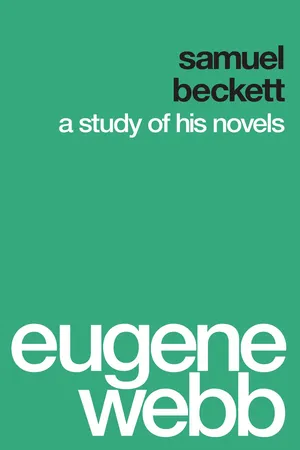
This book is available to read until 23rd December, 2025
- 192 pages
- English
- ePUB (mobile friendly)
- Available on iOS & Android
eBook - ePub
Available until 23 Dec |Learn more
About this book
Collectively the works of Samuel Beckett, winner of the 1969 Nobel Prize for Literature, reveal a remarkable continuity of theme. Together his writings present a particular view of life and each novel constitutes part of a larger whole.
Frequently asked questions
Yes, you can cancel anytime from the Subscription tab in your account settings on the Perlego website. Your subscription will stay active until the end of your current billing period. Learn how to cancel your subscription.
No, books cannot be downloaded as external files, such as PDFs, for use outside of Perlego. However, you can download books within the Perlego app for offline reading on mobile or tablet. Learn more here.
Perlego offers two plans: Essential and Complete
- Essential is ideal for learners and professionals who enjoy exploring a wide range of subjects. Access the Essential Library with 800,000+ trusted titles and best-sellers across business, personal growth, and the humanities. Includes unlimited reading time and Standard Read Aloud voice.
- Complete: Perfect for advanced learners and researchers needing full, unrestricted access. Unlock 1.4M+ books across hundreds of subjects, including academic and specialized titles. The Complete Plan also includes advanced features like Premium Read Aloud and Research Assistant.
We are an online textbook subscription service, where you can get access to an entire online library for less than the price of a single book per month. With over 1 million books across 1000+ topics, we’ve got you covered! Learn more here.
Look out for the read-aloud symbol on your next book to see if you can listen to it. The read-aloud tool reads text aloud for you, highlighting the text as it is being read. You can pause it, speed it up and slow it down. Learn more here.
Yes! You can use the Perlego app on both iOS or Android devices to read anytime, anywhere — even offline. Perfect for commutes or when you’re on the go.
Please note we cannot support devices running on iOS 13 and Android 7 or earlier. Learn more about using the app.
Please note we cannot support devices running on iOS 13 and Android 7 or earlier. Learn more about using the app.
Yes, you can access Samuel Beckett by Eugene Webb in PDF and/or ePUB format, as well as other popular books in Literature & Literary Criticism. We have over one million books available in our catalogue for you to explore.
Information
INDEX
The index that appeared in the print version of this title was intentionally removed from the eBook. Please use the search function on your eReading device for terms of interest. For your reference, the terms that appear in the print index are listed below
A and B (French version of Molloy)
A and C (Molloy)
Abbey Theatre, Dublin
Abel. See Christian imagery
Absurd, the: as a cultural concept
Absurdity: as theme in Watt
A la recherche du temps perdu (Proust)
Alexander of Hales
Ambrose, Father (Molloy)
Analogy, as principle in theology: Watt
Molloy
Anna Livia Plurabelle (Joyce): Beckett as translator of
Antepurgatory, Dante’s
Aquinas, Saint Thomas
Archetypal patterns: Watt
trilogy
Aristotle
Arsene (Watt)
‘Assez.’ See ‘Enough’
‘Assumption’
Astrology: in Murphy
Attachment, theme of. See Desire
Authors, Beckett’s characters as
Basil (The Unnamable)
Beatrice, Dante’s
Beckett, Samuel Barclay: biographical data
attitude toward philosophy
academic background
not a Cartesian
as the true narrator of the trilogy. See also Technique
Belacqua, Dante’s
‘Belacqua bliss’
Belacqua Shuah (More Pricks than Kicks): name derived from Dante
indolence
desire for isolation
sexual tastes
need for fellowship
physical impairments
need to keep moving
solipsism
pursued by Furies
attracted by insanity
desire to return to womb
feelings about death
unconcerned with politics
concern with justice of God
attitude toward Dante
self-deception
pose of self-sufficiency
implicit Cartesianism
narrator’s critical attitude toward
Bem (How It Is)
Bicycles: in More Pricks than Kicks
in Molloy
‘Bing.’ See ‘Ping’
Birth, as image; in Malone Dies
in The Unnamable
Bom (How It Is)
Bonaventura, Saint
Buddhism
‘Calmant, Le.’ See Stories
‘Calmative, The.’ See Stories
Calvet, Mother (Texts for nothing)
Cain. See Christian imagery
Camier (‘Mercier et Camier’): mentioned in trilogy
Carducci, Giosuè
Cartesian dualism: and for Beckett’s characters
Beckett’s attitude toward
implicit in thought of Belacqua Shuah
in Murphy
in Molloy, ‘The End,’ and How It Is. See also Descartes
Castle, The (Kafka)
Catholicism. See Irish Catholicism
Celia (Murphy): as parallel to Dante’s Beatrice
disaffection with life
Charcoal-burner (Molloy)
Christian imagery: purgatory
the Annunciation
Christmas
heaven
Cain and Abel
two thieves
Angelus
ecclesi...
Table of contents
- Cover
- Half title
- Title
- Copyright
- Dedication
- Preface
- Acknowledgements
- Contents
- I Introduction: Beckett and the Twentieth Century
- II Early Writings: The First Statements of Beckett’s Themes
- III Murphy
- IV Watt and the Transition to the Trilogy
- V The Structure of the Trilogy
- VI Disillusionment with Knowledge and Action
- VII Longing for Silence
- VIII Inferno
- IX Beyond the Trilogy
- X Postscript: Beckett’s Fiction since 1964
- Notes
- Bibliography
- Index